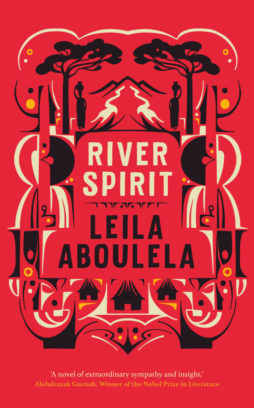You have no items in your cart. Want to get some nice things?
Go shopping
“Inevitable” is author Leila Aboulela’s favourite word, according to an interview on the podcast First Draft. She says, “I like fiction because of that, because it shows so strongly how everything you see is not just random. There is a lot behind it that has built up to this particular moment.”
Indeed, a sense of inevitability pervades River Spirit as seven narrators negotiate the personal, political and religious challenges of Sudan in the late nineteenth century. The novel follows the life of Akuany from age 11 into slavery and adulthood and it is her story that binds the seven male and female narrators together while families are torn apart by the rise of a revolutionary leader and self-pro-claimed Mahdi. His rise to power forces characters to choose different allegiances and prioritise different parts of their own identities.
Akuany’s relationship with Yaseen is central to the novel too and, in some respects, this a love story. He is the merchant who takes her and her brother Bol into his care when they are orphaned during a raid on their village. It is his sister, Halima, who renames and separates the siblings sending them on contrasting paths. Akuany becomes Zamzam and is passed between owners as a slave. Bol is renamed Ishaq and taken into Halima’s family as a son, the author in this way making names and the power of naming, a key theme.
When Zamzam learns from Touma that “One was not meant to ask questions, narrating the past did not erase it…It was the worst of manners to ask, Where did you get that scar? What was your name before? Where is your first child?” the weight of colonialism begins to be felt and it too emerges as a central theme that Aboulela handles deftly. The Mahdi’s uprising leads to the liberation of Sudan from Ottoman rule, the author conveying the complexity of the situation through the naming of a child.
Zamzam only becomes reconciled with her new name in the final stages of the novel when she hears the story of Hagar, from which her name is taken. “From that moment Zamzam’s perspective about her name changed. She who spoke the river’s language was named after holy water.” Water and rivers frequently symbolise freedom and happiness for Zamzam, whether as her idyllic playground as a child or her sanctuary as a slave. However, rivers crucially facilitate colonialism and war and throughout the novel, ships are tools of the oppressors.
The author also explores the role of General Gordon in Sudan, examining how he is perceived by the Sudanese and portrayed in Britain. Whilst he may be forgotten by many British people ignorant of their colonial past and uninterested in old statues, the stories told about his death in Britain had a direct effect on the future of Sudan. This is perhaps why Aboulela ends the novel not with Sudan’s liberation and Zamzam’s return to her village, but fourteen years later with the conquest of Sudan by the British. Indeed, in the final chapter, Salha asks, “Britain is now sovereign over all Ottoman lands that had been under Mahdist rule. This is what we Sudanese have unwittingly brought upon ourselves?”
River Spirit too is shaped by the religious beliefs of its characters. Their positions as wives, concubines, husbands or slaves are not coincidental, but integral to the plot. They see their fortunes shift and upturn as one development leads inexorably to the next, telling their stories in voices that are clear and distinct. Their language is engaging and accessible. Many of them come to define themselves through a move away from their home and their new relationships with those around them – experiences not dissimilar to those of the author herself.
Aboulela was born in Cairo, grew up in Khartoum and moved to Scotland in her twenties and has described how the move to a more secular country shaped her views of her own identity and faith. She has been nominated three times for the Orange Prize, now the Women’s Prize for Fiction, was the first winner of the Caine Prize for African Writing and has won the Saltire Fiction Book of the Year Award. Whether it was inevitable that Aboulela would come to write River Spirit or not is a question for her. The novel does, however, offer an interesting insight into Muslim lives in Sudan in the 1880s and 1890s. These fictional lives raise questions about how our history determines what may be perceived as “inevitable” today.
by Leila Aboulela
Saqi Books, 320 pages




